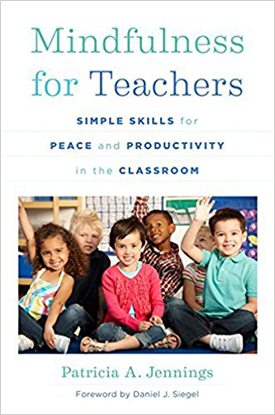Self-Care Strategies for Teachers
Mindfulness can help us notice when we’re out of balance.
By Patricia JenningsEvery time we board an airplane, the flight attendant demonstrates how to put on the oxygen mask in case the cabin pressure falls. We are instructed to put on our own mask before helping someone else, such as a child who needs our assistance. This is because if we don’t take care of ourselves first, we might pass out from lack of oxygen before we have a chance to help. This philosophy applies to all caring activities. If we don’t do a good job of caring for our own needs, we will have difficulty keeping up with the needs of others.
I have found that caring for myself is much more difficult than caring for others. I am often blind to my own needs and tend to overlook important aspects of my self-care. When I am not taking care of myself well, I start to feel overwhelmed and can become bitter and resentful.
Practicing mindfulness has helped me recognize this tendency by observing the scripts that creep into my mind: “No one appreciates all I do for them. No one cares about me.” When I’m in a sour mood, my caregiving takes on a quality of martyrdom and it’s easy to slip into guilt trips and blame. Once I began to realize what I was doing, I started to make self-care a priority. Now, when I notice myself feeling unappreciated, I ask myself, “What do I need?”
Over the years, I have found that I am not alone; this tendency to overlook self-care is common among teachers and other caregivers.
When I introduce the importance of self-care to groups of teachers in a mindfulness workshop, they often say, “But I don’t have any time to take care of myself.” The fact of the matter is that we have to make self-care a priority and set aside time for self-care activities. It takes time, self-awareness, and practice to find the balance of activities that best promotes our personal growth and development. Mindfulness can help us notice when we’re out of balance.
 It helps to spend some time assessing how we are spending our time and replace activities that are draining our energy with activities that nurture us. There are four primary domains of personal development that require self-care: physical, emotional, intellectual, and spiritual. The physical domain refers to our physical health and well-being. Caring for ourselves in this domain involves participating in physical activity to strengthen our body and improve our stamina. It involves eating right and getting enough sleep. Through practicing mindfulness, I have become very aware of how what I eat affects my well-being. I’m also very aware of the difference in my functioning when I’ve had enough sleep as opposed to times when I haven’t. By mindfully monitoring my physical body and noticing my energy level, I can be sure to care for it properly.
It helps to spend some time assessing how we are spending our time and replace activities that are draining our energy with activities that nurture us. There are four primary domains of personal development that require self-care: physical, emotional, intellectual, and spiritual. The physical domain refers to our physical health and well-being. Caring for ourselves in this domain involves participating in physical activity to strengthen our body and improve our stamina. It involves eating right and getting enough sleep. Through practicing mindfulness, I have become very aware of how what I eat affects my well-being. I’m also very aware of the difference in my functioning when I’ve had enough sleep as opposed to times when I haven’t. By mindfully monitoring my physical body and noticing my energy level, I can be sure to care for it properly.
The emotional domain refers to emotional health and well-being. We care for ourselves emotionally when we engage in activities that promote positive emotions, such as reading an inspirational book, laughing with friends, attending a concert or a game, or enjoying the company of our friends and family. Applying mindful awareness to our emotional state helps us recognize when our emotional life needs attention. We can notice ourselves becoming grumpy or blue and consciously choose to do something emotionally uplifting rather than wallowing in our bad mood.
The intellectual domain refers to our cognitive skills, our knowledge base, and our personal interests. Activities that nurture our intellectual life include doing puzzles and playing games for enjoyment, reading books that are intellectually challenging, and studying new subject matter, such as learning a language or taking a college course to learn something new.
The spiritual domain refers to our sense of meaning and connectedness to something greater than ourselves. While it includes any religious or spiritual beliefs we may have, it can also be experienced as a secular philosophical approach to what gives our life meaning—how we conceptualize our connection to and place in the larger world. Activities that nurture our spiritual life can include attending religious services, but can also involve any activities that instill a sense of meaning in our lives, such as finding awe in a gorgeous sunset, reading inspirational poetry, or singing in a choir. Practicing mindfulness is a powerful way to nurture our spiritual development in a secular way because it can provide access to direct spiritual experiences of meaningfulness and interdependence.
While we all need nurture and self-care in these four domains, everyone has her or his own way of interpreting and filling these needs. It can be helpful to make a self-care plan.
When I plan self-care strategies, I have a tendency to be overly ambitious and unrealistic. For example, I might decide that I’ll walk the 2 miles to work every day. But then it rains and I think that I’d prefer to drive rather than walk in the rain, and ultimately I feel bad and unmotivated because I haven’t kept my commitment and I feel like giving up. In the end, I realize that maybe walking every day is unrealistic and that it’s more about keeping active than walking a specific number of miles at a certain time of day.
When making a self-care plan, it helps to build in simple little self-care routines throughout the day. For example, when I’m in the shower, I take a moment to remember my intention for the day. Some teachers I know will take a moment in their car before they depart for work to consider and set their daily intention. If you regularly take public transportation, spending a few minutes doing breath awareness when you’re waiting for the subway or in transit is a great way to give yourself some caring attention.
I used to spend most of my lunch “half-hours” doing catch-up work at my desk. I realized that I wasn’t giving myself a break, so I created a new routine for myself. Weather permitting, I took my lunch to a nearby park, sat on a picnic bench, and enjoyed my lunch. I brought mindfulness into my eating, tasting each morsel and savoring each bite. I began to put more attention into the preparation of my lunches and looked forward to this time alone in the park. Doing this as much as possible made a dramatic improvement in the quality of my afternoon class session. I was able to give up the afternoon coffee that was getting me through the end of the day, and as a result I slept much better as well.
Patricia (Tish) Jennings, M.Ed., Ph.D. is an Associate Professor of Education at the Curry School of Education at the University of Virginia. She led the team that developed CARE for Teachers and is a Senior Fellow at the Garrison Institute. She is the author of Mindfulness for Teachers: Simple Skills for Peace and Productivity in the Classroom © 2015, from which this article is excerpted with the permission of the publisher, W. W. Norton & Company. It is from the chapter “The Heart of Teaching.”
Photo courtesy of unsplash.com
